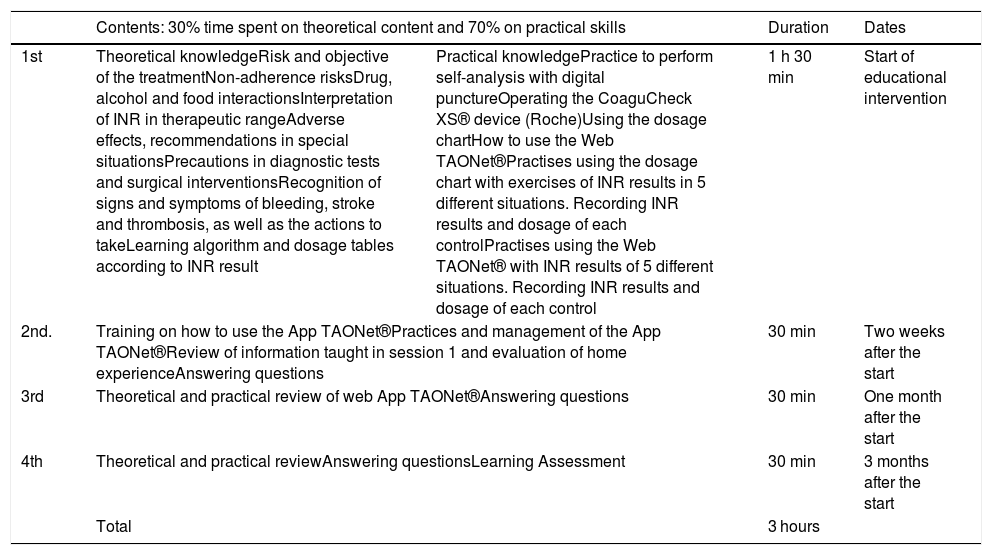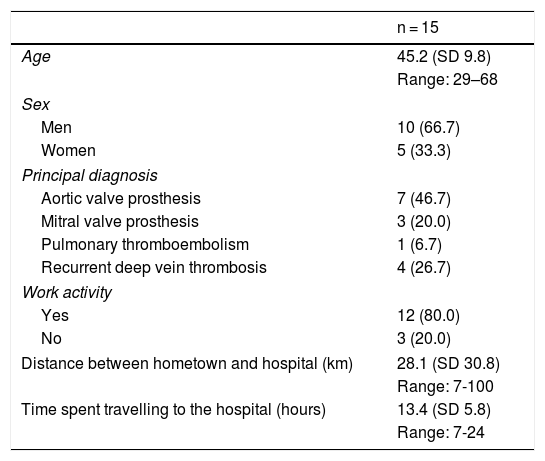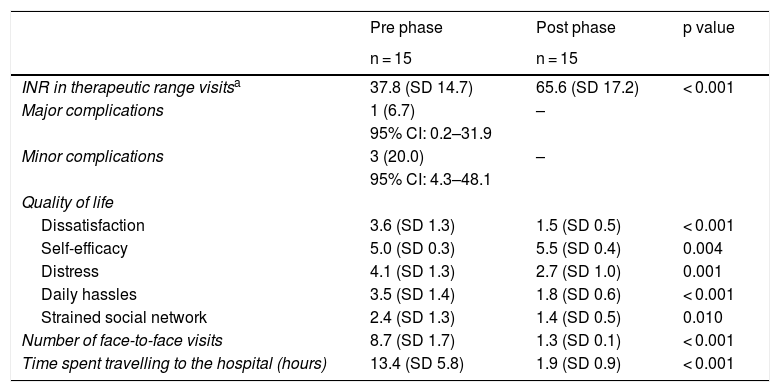To compare the efficacy of a self-monitoring programme vs. the conventional method used before the intervention in maintaining the international normalised ratio in the therapeutic range in patients receiving oral anticoagulants, as well as complications, quality of life and the time invested in the tests.
Materials and methodsPre-post pilot and feasibility study. The study included 15 patients over the age of 18 years who had been attending the monitoring programme for more than six months. In the pre phase, patients performed the tests and follow-up in the outpatient clinic. After conducting an individual training session with each patient to teach them how to perform venipuncture, use the coagulometer, manage dosing tables and subsequent follow-up from the virtual clinic, we compared the percentage of in-range INR tests, complications, quality of life, and the time invested in performing the tests pre- (conventional) and post-intervention (intervention for self-monitoring).
ResultsThe percentage of INR tests in the therapeutic range was significantly higher in the post-phase than in the pre-phase (65.6% vs 37.8%, p < .001). Likewise, the incidence of both minor and serious complications decreased in the post-phase (20% vs. 0%, and 6.7% vs. 0%, respectively). Finally, all five dimensions of the quality of life questionnaire improved significantly, while the time invested decreased.
ConclusionIn our experience, OAT self-monitoring is associated with a significant improvement in patient management, a reduction in the rate of complications, improved quality of life and timesaving.
Evaluar la eficacia de un programa de autocontrol en pacientes con tratamiento anticoagulante oral en el mantenimiento del nivel ratio internacional normalizado en rango terapéutico versus al método tradicional realizado antes de la intervención. Así como las complicaciones, la calidad de vida y el tiempo invertido en los controles
Pacientes y MétodosEstudio piloto de factibilidad con medidas pre-post. Se incluyeron 15 pacientes mayores de 18 años que acudían al control desde hacía más de seis meses. En la fase pre, el paciente realizaba los controles y seguimiento desde la consulta hospitalaria. Tras realizar una intervención educativa individual al paciente para capacitarlo en la punción, el uso del coagulómetro, el manejo de las tablas de dosificación y el posterior seguimiento desde la consulta virtual, se comparó el porcentaje de controles de INR en rango, las complicaciones, la calidad de vida, y el tiempo invertido para realizar los controles pre (tradicional) y post intervención (autocontrol).
ResultadosEl porcentaje de controles de INR en rango terapéutico en la fase post fue significativamente mayor que en la pre (65,6% vs 37,8% p < 0,001. Las complicaciones leves, como las complicaciones graves disminuyeron en la fase post (20% vs 0% y 6,7% vs 0%). Mejoraron significativamente las cinco dimensiones del cuestionario de calidad de vida y disminuyó el tiempo invertido.
ConclusionesEn nuestra experiencia el autocontrol TAO sugiere una mejora significativa en el control de pacientes, una disminución de las complicaciones, una mejora en la calidad de vida y un ahorro de tiempo.










